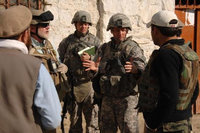Oxymorons rarely work. Sure, people can't get enough of jumbo shrimp. And there is a good reason why Shakespeare's, "Parting is such sweet sorrow. . ." still resonates four centuries after it was penned. But on the whole, oxymorons tend to signal an inconsistency that is impossible to resolve. More and more, trends in American foreign policy reflect exactly this kind of incongruity. Take some of the concepts that have evolved over the past few years: warriors as diplomats, for instance, or soldiers as state-builders. Now, Afghanistan's future, which will likely involve a "surge" of troops, places another seemingly discrepant phrase at the heart of a sustainable strategy: expeditionary diplomacy. As the Obama administration finishes its sweeping strategic review of Afghanistan policy, one of the likely conclusions will be an increased emphasis on expeditionary diplomacy. That leaves the question of just what the term means. So far, expeditionary diplomacy in Afghanistan has consisted of a network of 26 Provincial Reconstruction Teams -- 12 of which are commanded by the United States, the others by coalition forces -- whose goals are security, governance and development. Despite their perceived success, PRTs in their currently militarized configuration are counterintuitive in their conception, and in need of reform should they be central to any "surge" strategy.
Under the Influence: Late to the PRT

